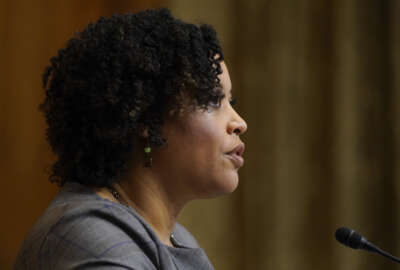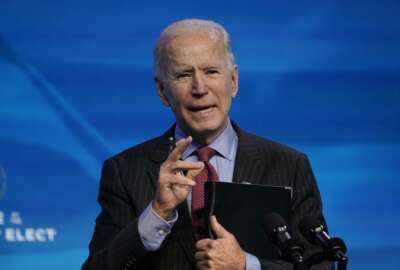

The Office of Management and Budget is launching Evaluation.gov as a hub for agencies to document how they will back up program performance with data and metrics.
The Office of Management and Budget is launching Evaluation.gov as a hub for agencies to document how they will back up program performance with data and metrics.
Evaluation.gov, which went live Wednesday, will serve as a one-stop-shop for agencies to chart progress in their journey to meet the goals of the Foundations for Evidence-Based Policymaking Act.
The legislation, which Congress passed in 2019, required agencies to name chief data officers, as well as chief evaluation officers and statistical officials.
Agencies will post final versions of their learning agendas, annual evaluation plans and capacity assessments on the site in February 2022. OMB expects that agency learning agendas and annual evaluation plans, which are mandated under the Evidence Act, include questions focused on equity and other administration priorities.
OMB is directing agencies to draft these evaluation policies as part of their four-year strategic plans that will run through fiscal 2026, and expects agencies to submit draft versions of those assessments later this month.
The website, in addition to meeting goals set under the Evidence Act, also flags four priority areas for evaluation under the Biden administration: climate change, racial equity, economic recovery, and COVID-19.
OMB, in a memo sent in June, said agencies should use evidence to support everything from human capital management to grantmaking and administering programs.
As part of President Joe Biden’s executive order on diversity, equity and inclusion, OMB directed agencies last month to identify bottlenecks that make their public-facing services inaccessible to certain demographics, and to collect more reliable data on how programs could better serve certain populations.
Diana Epstein, OMB’s evidence team lead, said the website will give researchers and private-sector partners a better understanding of the types of questions agencies have about program performance, and will allow these outsider partners to develop complementary research that can help fill in some of those gaps.
“We look forward to working together to build more evidence, through evaluation and other methods, that can ultimately be used to improve policies and programs on behalf of the American people,” Epstein wrote in a blog post on Evaluation.gov.
Danny Yagan, OMB’s associate director for economic policy, said learning agendas and annual evaluation plans will give agencies a roadmap to carry out evidence-building work where it’s most needed and figure out how programs fall short of meeting their intended goals.
”An orientation toward evaluation that acknowledges failure and emphasizes learning and continuous improvement is essential to meet the vision of an evidence-based government,” Yagan wrote in a blog post. “To help meet the challenge, for example, of improving racial equity, well-designed evaluations can offer important insights into how a program may be working well for some communities but is falling short in meeting the needs of others.”
The website also serves as a hub for the Evaluation Officer Council, which has members from all 24 CFO Act agencies, except for the Defense Department, which has yet to name an evaluation officer.
Matt Soldner, Education Department’s evaluation officer, said his office recently linked data on Pell grant recipients with income data from the IRS to better understand the agency’s return on investment.
Soldner, in a blog post, said agencies should focus on cross-agency collaboration in their learning agendas, reduce barriers to inter-agency data sharing, and ensure evaluation work filters up into agency policymaking decisions.
“No effort, particularly as one as young and complex as the implementation of the Evidence Act, proceeds without a hitch. It should come as no surprise, then, that there are still areas of growth for individual EOs, our work within our own agencies, the EOC, and the EOC’s collaboration with our peers,” Soldner wrote.
The Evaluation Officer Council is getting support from the Interagency Council on Evaluation Policy, which is made up of federal employees who are technical experts in evaluation work.
Jeffery Hemmeter, the Social Security Administration’s acting deputy associate commissioner for the Office of Research, Demonstration and Employment Support, said he and OMB’s Epstein lead the council’s steering committee.
The council, Hemmeter wrote, recently held consultations with several agencies, including the Justice Department, the Environmental Protection Agency and the State Department, on how to stand up evaluation capabilities.
The council is also focused on giving agency employees the training needed to conduct and oversee evaluation work. The ICEP is promoting training opportunities and hosting networking sessions, as well as sponsoring monthly “show and share” presentations for the federal evaluation community.
The council recently held sessions on COVID-19 and evaluation, evidence and non-competitive grant funding and getting agency buy-in for evaluation programs. The council is also preparing a memo outlining evaluation contract practices, and is compiling statements of work as templates for agencies to consider when contracting out evaluation services.
Copyright © 2025 Federal News Network. All rights reserved. This website is not intended for users located within the European Economic Area.
Jory Heckman is a reporter at Federal News Network covering U.S. Postal Service, IRS, big data and technology issues.
Follow @jheckmanWFED


